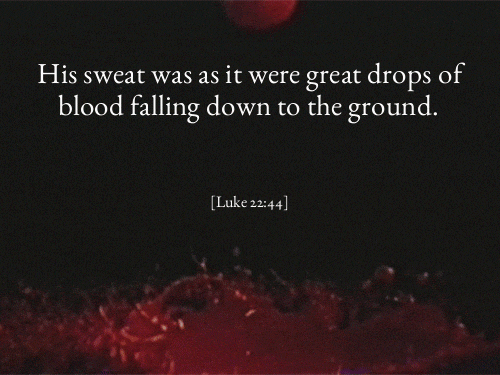Humble Disciple
Active Member
https://en.wikipedia.org/wiki/Hematidrosis
Jesus was so distressed in the garden of Gethsemane over His coming death that He was literally sweating blood, a medical condition known as hematidrosis, which only Luke reported on due to his background in medicine. Jesus purchased us with His unfathomable suffering, so that we’d live in obedient gratitude for the preciousness of His sacrifice.

Jesus was so distressed in the garden of Gethsemane over His coming death that He was literally sweating blood, a medical condition known as hematidrosis, which only Luke reported on due to his background in medicine. Jesus purchased us with His unfathomable suffering, so that we’d live in obedient gratitude for the preciousness of His sacrifice.
Atheist-turned-Christian Lee Strobel had been hesitant to accept this concept while a nonbeliever, recently telling The Christian Post, "I thought this was hyperbole or legend. Certainly people don't actually sweat blood!"
Strobel's desire to verify the claim led him to consult an expert on the Crucifixion, Dr.
Alexander Metherell, MD, PhD.
Strobel says that there was no shortage of skeptics who shared his sentiments. "Here's
where skeptics have a field day," he writes in his newly revised book The Case for Christ. "The
gospels tell us He (Jesus) began to sweat blood at this point. Now, c'mon, isn't that just a
product of some overactive imaginations? Doesn't that call into question the accuracy of the
gospel writers?" he asks in his book.
"Not at all," says Dr. Metherell.
The doctor sets the scene of the night before the Crucifixion. "It began after the Last Supper.
Jesus went with his disciples to the Mount of Olives — specifically, to the Garden of
Gethsemane. And there, if you remember, he prayed all night. Now during that process he
was anticipating the coming events of the next day," Dr. Metherell says in Strobel's book.
"Since He knew the amount of suffering He was going to have to endure, He was quite
naturally experiencing a great deal of psychological stress," says Metherell, who further
reveals that sweating blood really does occur — and it has a name: hematidrosis.
(1)
"It's not very common ... What happens is that severe anxiety causes the relase of chemicals
that break down the capillaries in the sweat glands. As a result, there's a small amount of
bleeding into these glands and the sweat comes out tinged with blood."
Metherell adds, "We're not talking about a lot of blood; it's just a very, very small amount."
Strobel tells CP that Metherell said the hematidrosis would have caused Christ's skin to
become "extremely fragile," so that when He was flogged the following day, his skin would
have been very sensitive.
Did Jesus Really Sweat Blood the Night Before His Crucifixion?

Last edited:
